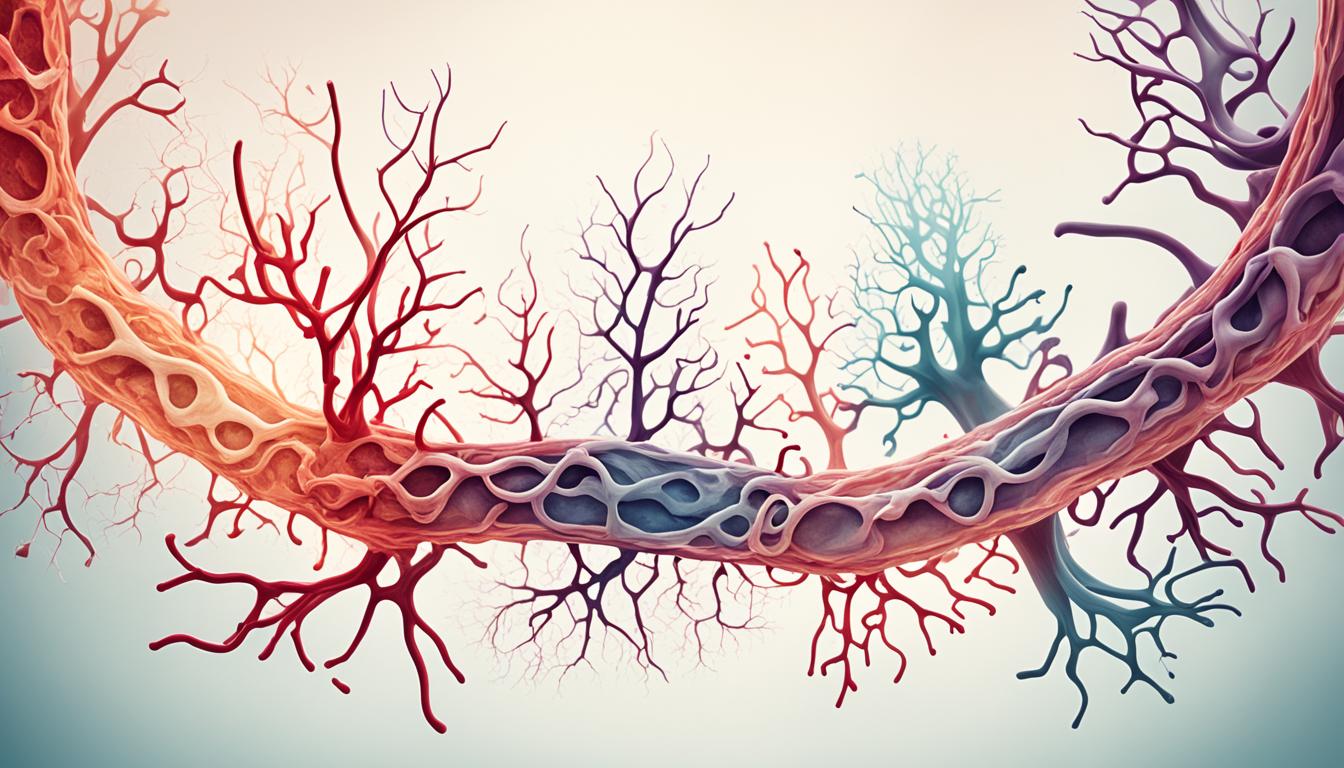Systemic sclerosis, or scleroderma, is a rare, chronic autoimmune disease. It affects the skin, joints, and organs with scarring and degeneration. The cause is unclear, but both genes and the environment seem to play a role.
This disease shows itself in many ways. People may notice their skin getting thicker. They might also experience Raynaud’s phenomenon, where fingers turn blue from cold or stress. Other signs include stiff joints, or problems with the gut, lungs, heart, or kidneys. Women between 20 and 50 are more likely to get it.
There’s no complete cure yet, but treatments can help manage the disease. These may include drugs, physical therapy, and changes in how you live. Scientists are also studying if stem cell treatments could work.
Key Takeaways:
- Systemic sclerosis, or scleroderma, is a rare autoimmune disease that affects many parts of the body.
- The exact cause of systemic sclerosis is unclear but likely involves genes and the environment.
- Signs like skin thickening, Raynaud’s phenomenon, and joint stiffness are common.
- Doctors treat systemic sclerosis with medicines, therapy, and lifestyle changes, and they are looking into stem cell therapy.
- Diagnosing the disease early and managing it well can reduce symptoms and protect the organs.
Types of Systemic Sclerosis
Systemic sclerosis, or scleroderma, appears in different ways. Knowing the types is key to getting the right treatment. It’s grouped into three main types.
Limited Systemic Sclerosis (CREST Syndrome)
Limited systemic sclerosis, or CREST syndrome, affects mainly the skin. It often hits the face, hands, arms, legs, and feet. Skin gets tight, thick, and hard over time. Those with it might face issues like a lung condition called pulmonary hypertension.
Diffuse Systemic Sclerosis
Diffuse systemic sclerosis spreads faster and affects more skin than the limited type. There is usually Raynaud’s phenomenon too, causing fingers to go cold and turn blue. It can also lead to issues with eating, heartburn, and problems in the bowels. This type can get serious quickly, affecting the lungs and causing a crisis with the kidneys.
Systemic Sclerosis without Scleroderma
Systemic sclerosis without scleroderma is rare. It focuses on harming internal organs unlike causing skin to tighten. It can mess with the gut, heart, lungs, or kidneys. Even though it’s rare, this form needs special care to handle its serious internal effects.
Learning about the types of systemic sclerosis helps with correct treatment planning. It lets doctors personalize care for patients. The next part will talk about diagnosing and caring for systemic sclerosis, showing how to give patients the best treatment.
Diagnosis and Management of Systemic Sclerosis
Systemic sclerosis is detected by looking at your health history, doing physical exams, and running tests. Doctors look for specific signs and symptoms to see how much your organs are affected. Blood tests are used to find certain antibodies that show up in autoimmune diseases. X-rays and CT scans are taken to check your lungs.
Unfortunately, there’s no cure for systemic sclerosis yet. But doctors can offer medicines to lower inflammation and control the immune system. These drugs also tackle the symptoms. Physiotherapy and specialized therapy can make your joints move better. It’s also key to stay active, eat well, and stay away from cold and smoking.
In rare cases, stem cell treatment might be an option. But, it still needs more study to know how helpful it really is.
Conclusion
Systemic sclerosis, known as scleroderma, is a tough autoimmune disorder. It affects the skin, joints, and organs. Mostly, women between 20 to 50 face this. Despite no cure, treatments exist to ease symptoms and protect against organ harm.
Treatment mixes meds, physical therapy, and life changes. Meds cut down inflammation and adjust the immune system. Physical therapy helps your joints move better. Eating well and staying active is key too.
Stem cell therapy offers hope for systemic sclerosis. This new method aims for better life quality. Keeping up with new treatments is vital in fighting this disease.

